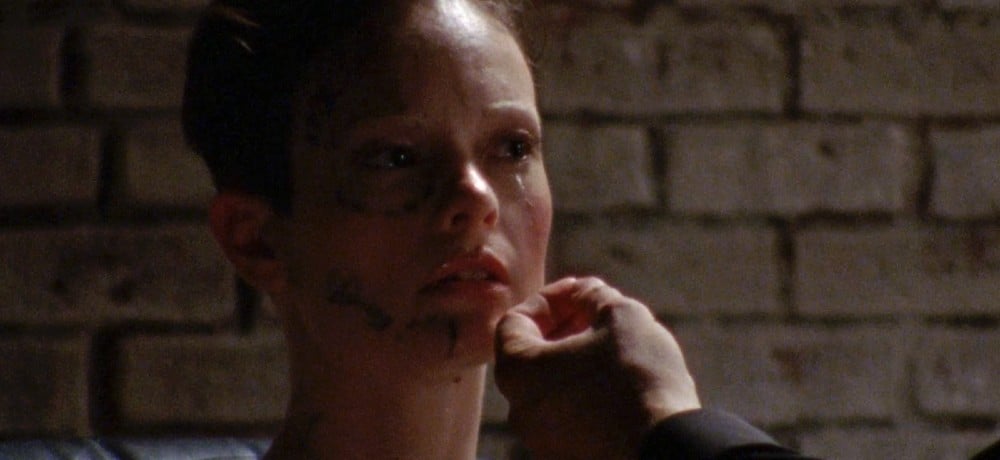






Best known for underground SOV staples Shatter Dead (1994) and Sixteen Tongues (1999), Scooter McCrae is back with his first feature in twenty-one years. Black Eyed Susan has all the makings of a truly nasty piece of work–aggressive full-frontal nudity, alarming gender politics, transgressive sexual violence, plot developments that flirt with real world conspiracies–but, in the end, this story of patriarchal sadism and the hypothetical moral quagmires surrounding artificial intelligence may just pull one too many of its gut-punches.
Damien Maffei (The Strangers: Prey at Night) stars as Derek, a struggling father who sees an opportunity to get back on his feet when a sleazy tech developer tasks him with testing his newest product: Susan (Yvonne Emilie Thälker) a lifelike robot companion built to receive and enjoy sexual abuse. Initially somewhat reticent, Derek eventually starts participating in the tests in earnest, but Susan’s rapid development soon has him questioning the ethics of her existence and whether certain buried desires and inclinations should ever be expressed – even within the safe and legal parameters which he finds himself.
Shooting for the first time on 16mm, McCrae’s film has a tactile, out-of-time quality that aligns itself visually with his earlier work despite its up-to-the-minute concerns. There’s a soft mid-aughts Cinemax After Dark flavor to the whole endeavor that somehow makes its cutting thematic edges even sharper, while the sensuous score by legendary Italian composer Fabio Frizzi adds a sickly alien romance that smartly brushes against the ugly claustrophobia of the visuals and narrative.
Though Yvonne Emilie Thälker spends the entirety of the film’s runtime in various states of undress, being poked, prodded, smacked, and violated with neither the desire nor ability to fight back, they give a strong, grounded (both literally and figuratively; one of the more disturbing details is that Susan’s legs are non-functional) performance and feel as if they are in total control of any given scene. Maffei is up to the task as a hapless, “nice guy” lead who may very well have depths of darkness he tries to hide from the world and, to the film’s credit, is asked to expose himself as thoroughly (though not as frequently) as Thälker. The two together are a highly compelling match and though there’s an airy stiltedness to the performances here, they’re stylistically apt for a film about the cognitive and moral disconnect between the realities of gender-related violence and its enactment on an AI surrogate.
That central quandary is where Black Eyed Susan finds itself in its stickiest, most provocative territory. This is the sort of material that could (i.e. will) be branded misogynistic in the hands of a male writer/director, but, coming as it does from McCrae’s own personal artistic vision, Black Eyed Susan has a straight-from-the-horse’s-mouth quality that makes it disarmingly confessional, if not exactly for him personally, then for the broader sex. The filmmaker’s central thesis that a sentient robot built for physical abuse would have market appeal is outrageously candid, and the way the film follows its urge to jab a finger right into the tenderest, most painfully unappetizing parts of men’s violent sexual fixations is audacious enough to make any squeamish detractor prick up and listen.
Yet, McCrae can’t help but let his leading man off the hook and, by the end, lets the film itself off the hook as well. What does it say about Derek that he uses and abuses Susan for the test? If she bruises and bleeds like an organic person would, is there any moral difference? If what he’s doing is bad, what could possibly be worse? McCrae gestures sheepishly toward an answer, and though the ending he gives Derek is unsatisfying, perhaps that’s the ultimate, very timeless message of Scooter McCrae’s erotic AI nightmare – that our personal dividing lines between right and wrong, affection and cruelty, what’s morally correct and what’s ethically indefensible, have always been and will continue to be more shifting and arbitrary than we’d like to admit, especially to ourselves.
Movie Score: 3.5/5
NSFW Red Band Trailer